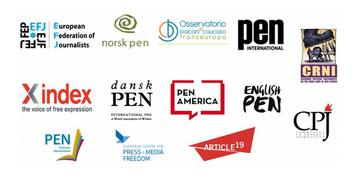
During the 42nd session in Geneva an oral statement was given to address the situation in Turkey, where civil rights and press freedom are endagered while journalists face every kind of threat
Together with other 12 international organisations active in the field of media freedom, OBCT signed a declaration that was presented as an oral statement yesterday (18.09) in Geneva during the 42nd session of the UN Human Rights Council. The speaker of Article 19, one of the biggest advocacy organisations in this field, was in charge of the reading during the general debate; the signatories - among which OBCT is the only one from Italy - are enganged in advocacy, research, and monitoring of media freedom and defense of threatened journalists. Beside the European Federation of Journalists, Index on Censorship and the Committee to Protect Journalists, there is the ECPMF, European Centre for Press and Media Freedom, tightly connected with OBCT in several research projects on media freedom. Yesterday OBCT had the chance to make its voice heard and urge Turkey to change its attitude towards journalism and human rights.
Here the text of the statement:
42nd Session of the UN Human Rights Council
Joint Statement delivered by ARTICLE 19 on behalf of a group of civil society organisations
Delivered by Lucy Bye
Mr. President,
It is now over three years since the Turkish Government intensified its repressive crackdown against oppositional and dissenting voices in the country. This ongoing freedom of expression crisis demands the Council’s urgent attention.
Although the State of Emergency was lifted in July 2018, the sweeping emergency decrees that enabled the government to pursue its unprecedented crackdown against the media and civil society have now effectively been absorbed into the ordinary legal framework.
Since the 2016 coup attempt, at least 180 media outlets have been forcibly closed. Over 220,000 websites have been blocked. At least 132 journalists and media workers are behind bars, and hundreds more have been prosecuted as terrorists, solely for their journalistic work, in the absence of any credible or even individualised evidence.
The rule of law is being systematically dismantled. Trials are increasingly Kafkaesque as the executive’s grip on the judiciary has continued to tighten. Journalists Ahmet and Mehmet Altan and Nazli Ilicak were initially forced to defend themselves against charges that they sent ‘subliminal messages’ in support of the coup attempt. Civil society activists and media workers have faced prosecution simply for allegedly downloading the secure communications app ‘Bylock’. In recent months, the government has even sought to rewrite history, charging 16 leading civil society figures who participated in the peaceful 2013 Gezi Park protests with attempting to overthrow the government. Osman Kavala is in his 24th month of pre-trial detention, in a flagrant violation of his fair trial rights.
Last week, whilst the convictions of six of his Cumhuriyet colleagues were overturned, Ahmet Şik was served new, unfounded charges including propaganda for a terrorist group and “insulting the Turkish state” that may see him sentenced to 30 years in prison. This judicial harassment follows a violent attack against Şik by police on 20 August, during a protest in front of an Istanbul Court against the dismissal of three opposition mayors in three cities in the South East. No one has yet been held accountable.
We call on all States at this Council to use their voice and urge Turkey to change course, and take immediate steps to restore the rule of law, and end its assault on media freedom and civic space.
I thank you, Mr. President.
Cartoonists Rights Network International
Committee to Protect Journalists
European Centre for Press and Media Freedom (ECPMF)
OBC Transeuropa
European Federation of Journalists (EFJ)
PEN America
PEN International
Norwegian PEN
English PEN
Danish PEN
German PEN
Questa pubblicazione è stata prodotta nell'ambito del progetto European Centre for Press and Media Freedom, cofinanziato dalla Commissione europea. La responsabilità sui contenuti di questa pubblicazione è di Osservatorio Balcani e Caucaso e non riflette in alcun modo l'opinione dell'Unione Europea. Vai alla pagina del progetto
Log in or create a user account to comment.

 Press freedom in Turkey: the voice of OBCT at the United Nations Human Rights Council
Press freedom in Turkey: the voice of OBCT at the United Nations Human Rights Council




 Tutti i contenuti disponibili sul sito di Osservatorio Balcani e Caucaso sono distribuiti con licenza
Tutti i contenuti disponibili sul sito di Osservatorio Balcani e Caucaso sono distribuiti con licenza  To Top
To Top